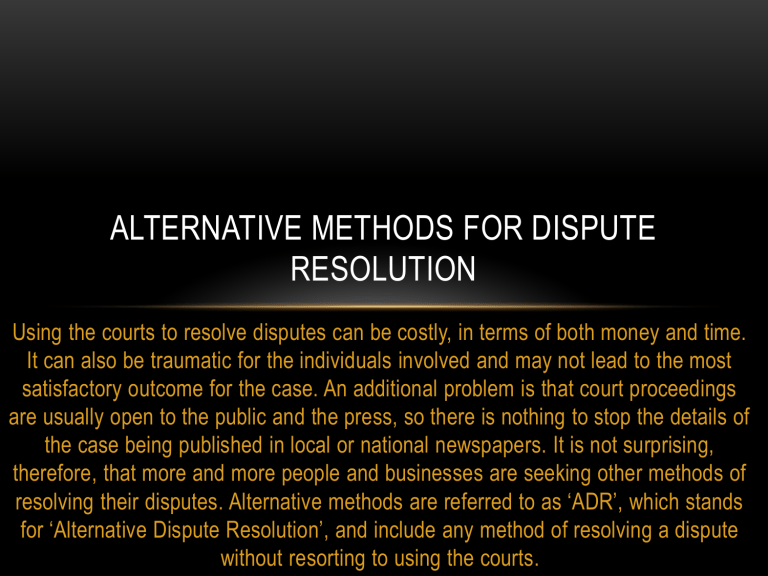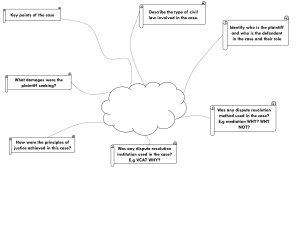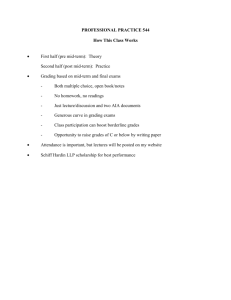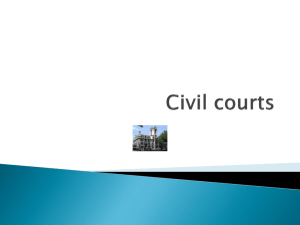
ALTERNATIVE METHODS FOR DISPUTE RESOLUTION Using the courts to resolve disputes can be costly, in terms of both money and time. It can also be traumatic for the individuals involved and may not lead to the most satisfactory outcome for the case. An additional problem is that court proceedings are usually open to the public and the press, so there is nothing to stop the details of the case being published in local or national newspapers. It is not surprising, therefore, that more and more people and businesses are seeking other methods of resolving their disputes. Alternative methods are referred to as ‘ADR’, which stands for ‘Alternative Dispute Resolution’, and include any method of resolving a dispute without resorting to using the courts. ENCOURAGING ADR In the 1990s there were many moves to encourage the use of ADR: for example, the Woolf Report included more use of ADR as one of its recommendations. As a result the 1999 Civil Procedure Rules allow judges to ‘stay’ court proceedings, that is stop the proceedings temporarily, so that the parties can try mediation or other ADR methods. EMPLOYMENT CASES ACAS (Advisory Conciliation and Arbitration Service) ACAS has specially trained conciliation officers who have a great deal of experience of employment disputes. Success of this service can be seen from the fact that over half of all claims fi led are settled in this way FUNDING OF CASES Under the legal aid rules, funding is not available for a court case if it could be dealt with by an alternative method of resolution NEGOTIATION • Negotiating directly with the other party • Advantage of being completely private, and is also the quickest and cheapest method of settling a dispute • Solicitors can be hired but the cost will rise • One big worrying aspect is that cases are dragged for a long time MEDIATION • Neutral mediator helps the parties to reach a compromise solution • Role of the mediator is to find a common ground • Mediator will not tell his views and try to act more as a “Facilitator”. However he/she can be consulted for merits of the case. • Mediation is only suitable when there is some hope to solve the issue • Mediation can take any form parties like and they are in control of proceedings. FORMALIZED SETTLEMENT CONFERENCE (SUB TYPE OF MEDIATION) Formal method of mediation Parties present a case to panel (composed of a decision making executive from each party, and a neutral party) Decision is not strictly legal one hence can be challenged Since less formal it gives the companies chance to continue business Court is more public and strict so it is said that with mediation everyone wins. MEDIATION SERVICES Growing number of commercial mediation services Disadvantage of mediation is that cases might not be solved (although 80% of cases are solved) Matter will go to courts if unresolved Mediation is available for big and small both civil matters CONCILIATION Quite similar to mediation Main difference is that conciliator will play a more active role Conciliator will provide grounds for compromise and the possible basis for settlement ADVANTAGES OF ADR faster cheaper more flexible less stressful possible to agree resolutions that are not available in court (in courts only compensation is damages or equitable remedies but in ADR variety of compensations can be given) ARBITRATION Two ways Courts use a more informal process to hear proceedings Parties agree to submit their claim for private arbitration AGREEMENT TO ARBITRATE • arbitration is the voluntary submission by the parties, of their dispute, to the judgment of some person other than a judge. Such an agreement will usually be in writing, and indeed the Arbitration Act 1996 applies only to written arbitration agreements. • An agreement to go to arbitration can also be made after the dispute arises. Arbitration is becoming increasingly popular in commercial cases. • Arbitration Act 1996 states that the parties are free to agree on the number of arbitrators, so that a panel of two or three may be used or there may be a sole arbitrator. THE ARBITRATION HEARING • Procedure is left to the parties as they desire • Paper arbitration where parties write down their points on piece of paper • Parties can submit documents to arbitrator for submission • If there is a witness he has to take oath • The decision made by the arbitrator is called “AWARD” ADVANTAGES OF ARBITRATION • Parties may choose their own arbitrator • Expert can be called for quality of evidences • Hearing time and place can be arranged to suit parties • Procedure can be flexible • Matter is dealt in private so no publicity • More quick than a court hearing • Cheap than court • Award is normally final DISADVANTAGES OF ARBITRATION • An unexpected legal point may aware which need consultation of lawyers • If professional arbitrator is used his fees maybe expensive • It will be expensive if parties opt for formal hearing with all the witnesses and lawyers • Rights of appeal are limited • Delays of commercial and professional arbitration can be as great as a court




